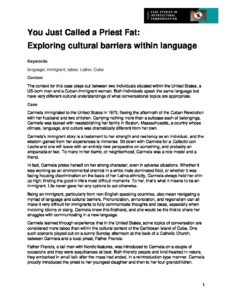You Just Called a Priest Fat: Exploring cultural barriers within language
Keywords
language; immigrant; taboo; Latinx; Cuba
Context
The context for this case plays out between two individuals situated within the United States, a US-born man and a Cuban-immigrant woman. Both individuals speak the same language but have very different cultural understandings of what conversational topics are appropriate.
Case
Carmela immigrated to the United States in 1973, fleeing the aftermath of the Cuban Revolution with her husband and two children. Carrying nothing more than a suitcase each of belongings, Carmela was tasked with reestablishing her family in Boston, Massachusetts, a country whose climate, language, and culture was dramatically different from her own.
Carmela’s immigrant story is a testament to her strength and resiliency as an individual, and the wisdom gained from her experiences is immense. Sit down with Carmela for a Cafecito con Leche and one will leave with an entirely new perspective on something, and probably an empanada or two. To many in her barrio, or neighborhood, Carmela was a role model and a friend.
In fact, Carmela prides herself on her strong character, even in adverse situations. Whether it was working as an environmental chemist in a white male dominated field, or whether it was facing housing discrimination on the basis of her Latina ethnicity, Carmela always held her chin up high, finding the good in life’s most difficult moments. To her, that’s what it means to be an immigrant. Life never gave her any options to act otherwise.
Being an immigrant, particularly from non-English speaking countries, also mean navigating a myriad of language and cultural barriers. Pronunciation, annunciation, and regionalism can all make it very difficult for immigrants to fully communicate thoughts and ideas, especially when involving idioms or slang. Carmela knew this firsthand, and she would be the first to share her struggles with communicating in a new language.
Carmela learned through experience that in the United States, some topics of conversation are considered more taboo than within the cultural context of the Caribbean island of Cuba. One such scenario played out on a sunny Sunday afternoon at the back of a Catholic Church, between Carmela and a local priest, Father Francis.
Father Francis, a tall man with Nordic features, was introduced to Carmela on a couple of occasions and they were acquittances at best. Both friendly people and kind-hearted in nature, they embarked in small talk after the mass had ended, in a reintroduction-type manner. Carmela proudly introduced the priest to her youngest daughter and then to her four grandchildren.
Carmela thought that Father Francis looked well-rested and healthy, and asked him with a warm grin, “Father, have you lost any weight?” She rolled the R in his title. The priest smiled rosily in reply, “I have actually, thank you for noticing!” Carmela nodded, responding sheepishly, “Good, because you looked fat the last time I saw you.”
There was a brief moment of pause before Carmela’s daughter’s face sunk into an appalled frown, while her grandchildren struggled to contain their laughter. To Carmela’s grandkids, they knew that weight was not a taboo topic of discussion in Cuba, treated much more like a fact than an opinion. “This is a hilarious misunderstanding!” they thought to themselves. But to Father Francis, it was so much more.
Unknown to anyone else, Father Francis struggled with his body image for his entire life. His scowl practically reached his own chin. Reddened in the face, Father Francis excused himself from the conversation circle, his expression visibly struck with humiliation and shame. Carmela, overwhelmingly confused by his reaction, was greeted by a rapid, infuriated explanation from her daughter. Flooded with embarrassment and guilt, Carmela found herself in an extremely uncomfortable position, unsure of what to do or say next.
Discussion Questions
As you consider this case, discuss:
- What complexities or cultural frames draw Carmela and Father Francis to interpret the exchange differently?
- How might the power dynamics between Carmela, a lay woman, and Father Francis, an ordained man, affect their communication exchanges?
- What could Carmela and Father Francis learn from this particular encounter?
- What are some practical ways Carmela and Father Francis could learn more about the cultural identities of each other and share their interpretations of the situation?
- How does one increase their cultural empathy and expand their culturally relativist perspectives to include multifaceted experiences of individuals?
- How do you overcome the fear to “say the wrong thing” and still engage your authentic self in the process of cross-cultural communication?
Additional Resources
Additional recommended resources to explore the central themes in this case are available below.
- “Cultural Barriers to Communication.” Businesstopia, 6 Jan. 2018.
- “Cultural Obstacles to U.S.-Cuba Relations.” Brookings, 30 Nov. 2010.
- “Examples of Taboo Language from Around the World” The Language Blog, 6 Feb. 2017.
- “More Than Miles: The Taboo Traditions That Separate Us – Reaching Beyond Western Taboos.” Penn State, 27 Sept. 2020.
- “Spanish Language Word GORDO: Insult, Compliment or None of the Above?” Speaking Latino, 16 Jan. 2017.
Corresponding Author
Boyle, John, American University, Washington, DC, United States of America. Email: jmboyle8@gmail.com


